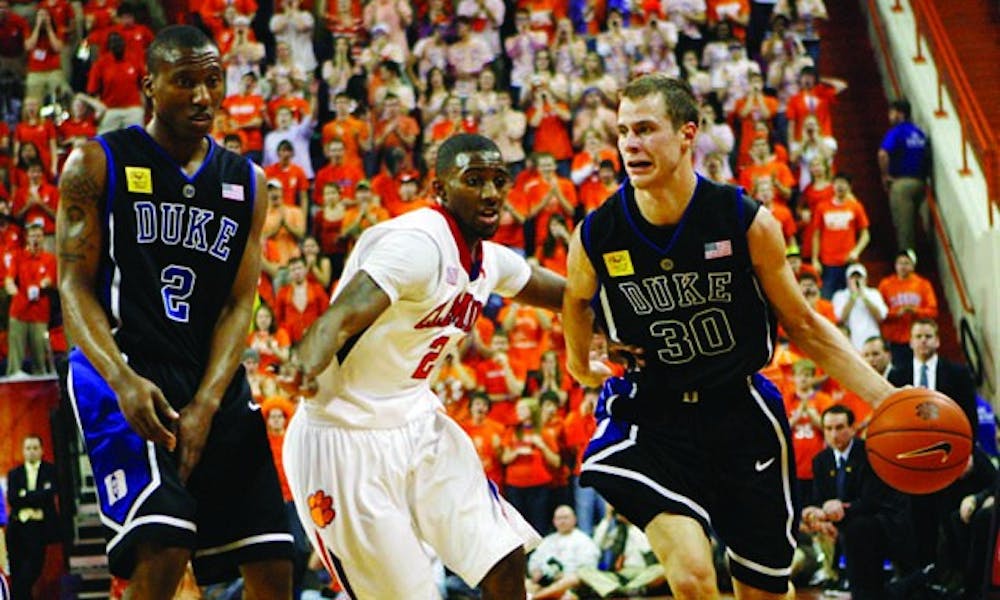Duke’s 60-47 win over Clemson Saturday was huge.
It was big for all the obvious reasons: for avenging last year’s 27-point blowout in Littlejohn Coliseum, for preventing a two-game losing streak, for demonstrating the Blue Devils’ ability to calmly beat the full-court press and for moving Duke to within percentage points of first place in the ACC.
Equally important, however, may be its implications for the NCAA Tournament.
But, you’re probably thinking, aren’t NCAA Tournament games played at neutral sites? And haven’t the Blue Devils been dominant at neutral sites this season?
Well, yes and no. Duke is 4-0 in neutral site contests this season, including a convincing win over Connecticut in the NIT Season Tip-Off and a 35-point thrashing of then-No. 15 Gonzaga Dec. 19. And obviously, the Blue Devils’ Tournament games will take place on neutral courts.
Unfortunately for Duke, though, they won’t happen in Madison Square Garden.
See, when it comes to the Blue Devils, there is a difference between the World’s Most Famous Arena and just about every other gym in the country. It’s not just that Duke tends to win in New York. (It is 3-0 there this season and 21-6 all-time under head coach Mike Krzyzewski.) The Garden crowd is so pro-Duke that the team refers to it as Cameron North.
The same can’t be said of wherever the Blue Devils end up playing their Tournament games in seven weeks. I have covered NCAA Tournament games in two different stadiums. I’m willing to discount the hostility in the Greensboro Coliseum last year, as it was filled with North Carolina fans, but the anti-Blue Devil sentiment in the Verizon Center in 2008 was surprising. Duke shared that Washington, D.C. pod with Xavier, Purdue, West Virginia, Arizona, Baylor, Georgia and Belmont—none of which is close to a rival. And despite what should have been a fairly favorable location for the Blue Devils, with Duke’s strong alumni base in the nation’s capital, Blue Devil fans were greatly outnumbered.
Some of that hostility was due to fans’ tendency to root for the underdog, but it went beyond that. The fact is, people hate Duke and will find any possible reason to cheer against the Blue Devils. (I know, I know, I’m on pace to set a record for the most obvious statements in a single column.)
What does any of this have to do with Clemson? Before Saturday, three of Duke’s four wins away from Cameron Indoor Stadium had taken place in the Garden, with the other one coming 25 miles from Jon Scheyer’s hometown in front of an estimated 500 of his friends and family members. Losing three straight road games wasn’t overly problematic for the Blue Devils’ ACC title chances, but going 0-3 on the road didn’t bode well for the Tournament if you agree that the typical Duke March Madness contest is more like playing at Georgia Tech than playing in MSG.
I tried to find a way to quantify the importance of road games for NCAA Tournament success, but I quickly realized there are way too many other variables—who’s on the team and who you play in the Tournament, for instance—to make any kind of conclusion. Interestingly, though, the 2000-2001 national championship squad played the most road and pseudo-road games (neutral sites close to the opponent’s campus) of any Duke team in the last decade, with 12. For example, that squad played No. 3 Stanford in Oakland, Calif. (and lost by one).
The 2006-2007 team, which was upset in the first round of the Tournament, was tied for the fewest road and pseudo-road games, with nine. That means Duke played eight ACC road games, plus only one other game on the road—and even that came in MSG, against St. John’s.
Again, there are a lot of variables at play—having Jason Williams, Shane Battier and Carlos Boozer on the roster definitely doesn’t hurt—but it may hint at the importance of getting road experience before the Tournament. (The 2000-2001 team won 11 of those 12 games. You can interpret that however you want. Either playing—and winning—road games predicts Tournament success, or that team was great and it didn’t matter if they were playing on the road. I’m guessing it’s the latter, but I think playing on the road helped set them up for that Tournament run.)
If nothing else, we have anecdotal evidence. Wherever Duke plays in the NCAA Tournament, it will not be as inhospitable as Littlejohn, but it also will not be as friendly as the Garden. The Clemson win was just one game, and the Blue Devils still have plenty of issues to work out, but getting a victory in one of the toughest road games of the year will pay dividends in March.
The next step? Exorcise those Verizon Center demons against Georgetown.
Get The Chronicle straight to your inbox
Signup for our weekly newsletter. Cancel at any time.

